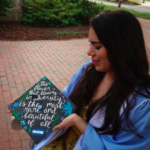 As most graduate students do, I relocated to continue my pursuit of higher education. While I understood what I wanted to focus on in my studies, the way I wanted to approach it was unclear. Ultimately, I decided on pursuing a Ph.D. in social work/welfare.
As most graduate students do, I relocated to continue my pursuit of higher education. While I understood what I wanted to focus on in my studies, the way I wanted to approach it was unclear. Ultimately, I decided on pursuing a Ph.D. in social work/welfare.
However, social work is unique from other academic fields in that a master’s degree in social work is required before obtaining a Ph.D. This meant that my search for schools narrowed, but ultimately, I accepted admission to the University at Buffalo School of Social Work. My first year in Buffalo was solely master’s courses, and it was an extremely pivotal year of my life. As a Latinx person from the South, I was met with a lot of confusion, stereotypes, and interesting questions from my peers.
Originally, I am from a small town in North Carolina. Essentially, it is the epitome of rurality with the majority of the county being farmland. Growing up, I heard nothing short of racist slurs, homophobic remarks, and glaring classism. However, it was not until my time outside of the South that I realized people believed they were immune to these beliefs.
While I grew up as an ethnic minority and low-income, I want to focus on my queer identity and how it is interwoven with my identity as a Southerner.
Once I moved up to Buffalo, the people there made a lot of assumptions about where I’m from and how I grew up. Whenever I mentioned I was from the South, they asked me a lot of questions regarding the racism and homophobia in the region — without the acknowledgement that these forms of oppression are central to the foundation and existence of the United States as a whole since it’s a colonized land.
With Buffalo specifically, there is a widespread history of segregation, gentrification, and anti-Black attitudes and actions. Seeing my white classmates acknowledge this and the role they played in it, however, was rare. Their discussion about the South disregarded the marginalized communities that reside here and was only meant to avoid their own contribution as oppressors.
In discussing queerness during graduate school, I discovered people in Buffalo assumed queer people didn’t exist in the South, didn’t want to live in the South, and should move from the South. They never understood that the South is the home to largest concentration of LGBTQ+ identifying individuals (particularly queer people of color) and that many queer individuals have strong ties to Southern culture.
The erasure of queerness from the South, and by extension rural communities, is suffocating. How do we own and accept the intersectional identities of marginalized people when other people are denying they exist?
Since I obtained my master’s degree in social work, I also understand how this lack of acknowledgement impacts the mental health and well-being of queers in the South. Growing up queer in the South is a specific experience, one that should be honored with community and the recognition of our efforts to exist in a space that is not always welcoming.
Already, young LGBTQ+ people in the South are enduring significant mental health challenges and are more likely to attempt suicide than youth in other parts of the region. While mental health is a complex topic, it has been found that for Southern youth, it is imperative they have spaces that are welcoming and affirming to their identities.
But instead of considering ways to make Southern LGBTQ+ youth feel secure, I have found that the reaction of residents from other regions of the United States is to shame the South and cite class and educational differences for these anti-queer sentiments. Southerners, especially queer Southerners, are shamed for who represents them in the federal government, without acknowledging the rampant gerrymandering that prevents marginalized communities from being properly represented. This shaming and ignorance results in queer individuals being isolated and suffering from various mental illnesses.
As a queer person constantly challenging and addressing these assumptions, it can be difficult to maintain my own mental health. However, I think that sharing spaces and communities with those who understand the rural and Southern queer experience is extremely healing. I’ve done this within my own social life, but also through media.
For any queer individuals struggling with identity, community, and feeling secure, I recommend connecting with the stories and histories of queer people in the South. One of my favorites is Country Queers, an oral history project that features several queer individuals from the rural South. I also enjoy Dixieland of the Proletariat, which doesn’t focus on queer topics exclusively, but provided a lot of background on the history of marginalized communities in the South.
A large part of Pride Month is reclaiming and recognizing the histories that are not readily discussed, and as a Southern queer Latina, I plan to do just that.
Women AdvaNCe compiled a list of Pride Month events happening this June! You can check it out here.
 Jessica J. Mencia (she/her/ella), MSW is a PhD student at the University at Buffalo School of Social Work and an alumni of the University of Chapel Hill. Her research centers on abortion access and sexual rights and risk-taking in marginalized young women and girls. She can be contacted at jjmencia@buffalo.edu.
Jessica J. Mencia (she/her/ella), MSW is a PhD student at the University at Buffalo School of Social Work and an alumni of the University of Chapel Hill. Her research centers on abortion access and sexual rights and risk-taking in marginalized young women and girls. She can be contacted at jjmencia@buffalo.edu.

There are no comments
Add yours